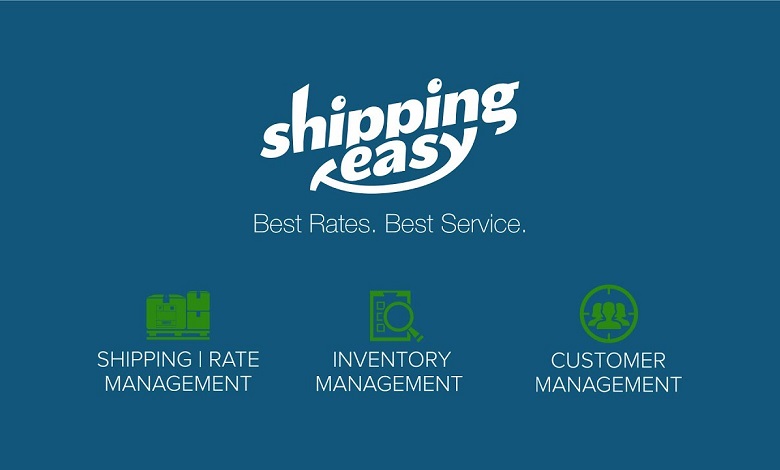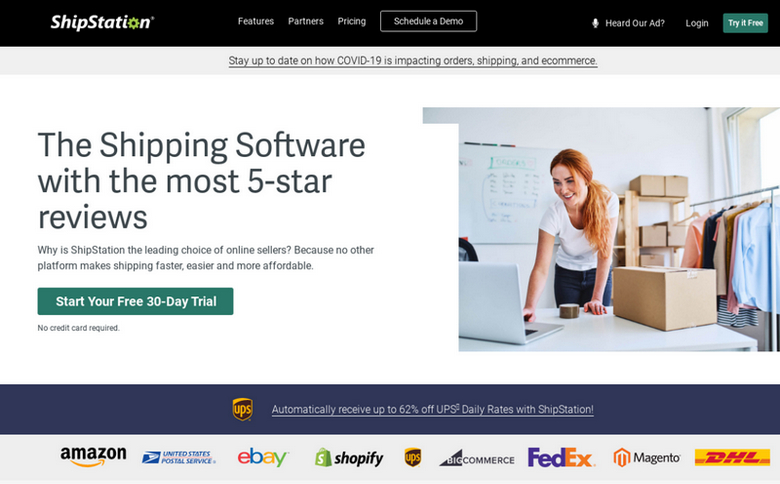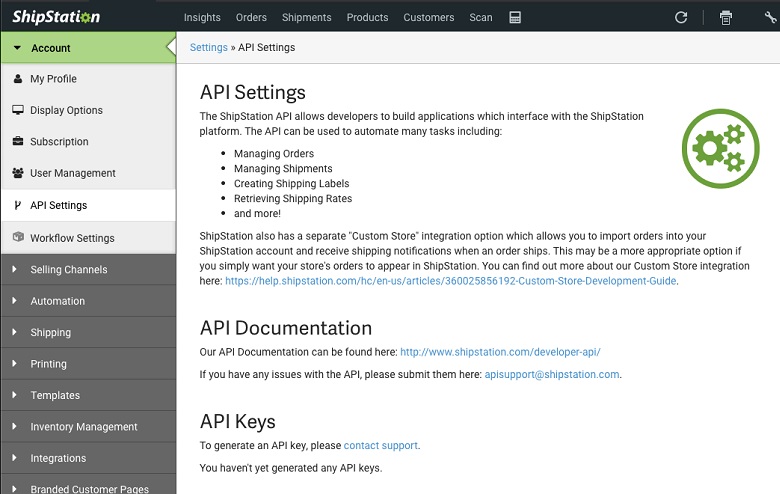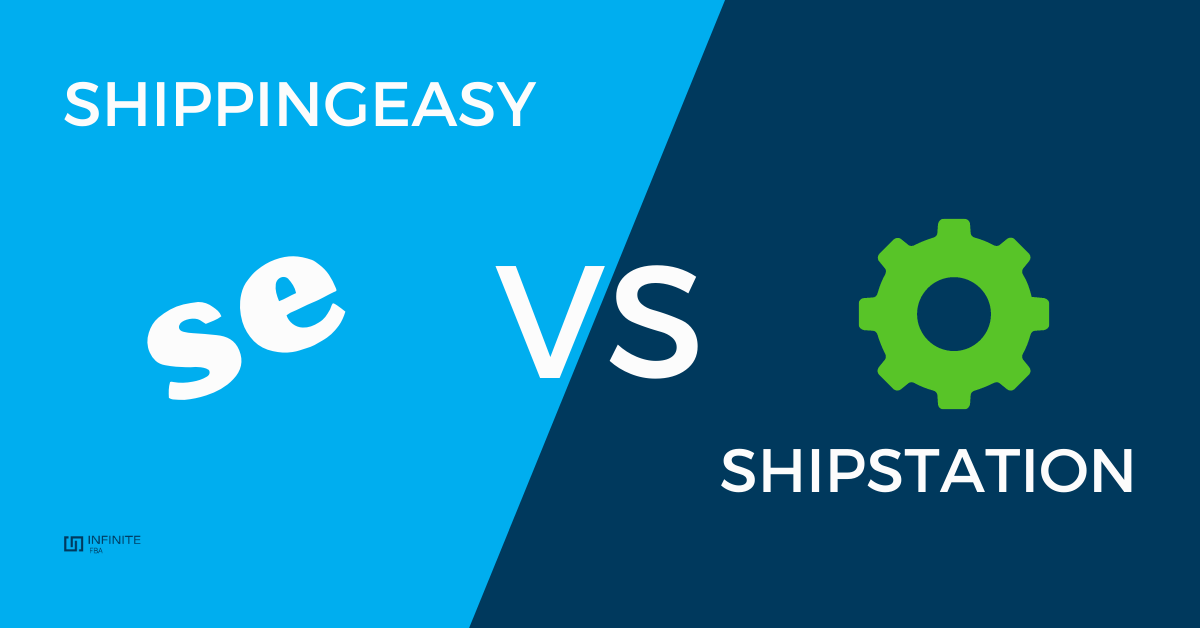There is no shortage of shipping solutions these days. But with so many products available, it can be a bit tricky to pick one that perfectly suits your online retail business.
This is particularly the case if you are trying to strike a balance between affordability and ease of use while not losing sight of functionality. Two shipping solutions that perfectly match these qualities are ShippingEasy and ShipStation.
This guide will compare the similarities and differences between ShippingEasy vs ShipStation to help you choose the most suitable option for your online selling business.
What is ShippingEasy?

ShippingEasy is a web-based shipping platform designed to streamline online order fulfillment and inventory for e-commerce sellers.
It is arguably the easiest online shipping solution available. It integrates with shopping carts, marketplaces, and over 50 e-commerce platforms, including Amazon, eBay, Woo Commerce, Shopify, Walmart, and Esty among others. This significantly demystifies order management and offers tracking in real-time.
Users can optimize order fulfillment with batch printing and highly efficient automation. Plus, the platform offers access to the lowest USPS shipping rates to reduce overall cost and also allows users to connect their FedEx or UPS accounts.
The software works great for e-commerce merchants looking for an affordable and easy-to-use shipping solution to ship items to customers. It also suits brick-and-mortar merchants who are looking to make the switch to online selling.
ShippingEasy Features
ShippingEasy offer users many features and shipping services, such as:
- Branded tracking: You can brand the entire customer experience starting from the order right to the delivery. Branding will minimize distractions in a highly competitive industry, increase your brand visibility, and increase the chances of repeat business. Users can add logos on labels, customize tracking emails sent to customers, and use social media and web links.
- Shipping workflow: All your orders from different platforms are in one place so you can better manage them and automate shipping with your own rules.
- Tracking and returns: You can send real-time tracking information to your customers and add a tracking number to drop-shipped orders. You also have the option to send return labels by request or at the time of shipment.
- Alexa for shipping: You can get a lot done with less clicking, thanks to Amazon Alexa. You only need to use your voice and you’ll get detailed order information, such as rate quote and destination. You can batch print labels, print packing slips and pick lists, and even buy USPS postage all by using voice commands.
Pros
- Affordable pricing plans: Plans start at $5 for 50 shipments per month. This is a lot more affordable compared to many other shipping software packages available.
- Easy set up: Setting up and getting started can be completed in a matter of few minutes. The platform is user-friendly with an incredibly simple interface. There is no steep learning curve with the software, and just about anyone can find their way around the platform quite easily.
- Great functionality: Users can both order fulfillment and marketing all in one place, thanks to the software’s phenomenal flexibility and functionality.
- Robust support services: ShippingEasy makes it easy for users to get help by offering a variety of ways to reach the support team. The support services include phone support, email, chat, and a forum where users can ask questions and get responses from other users as well as experts.
- Efficient customer service: The customer service is extremely helpful and treats issues very quickly, as many reviews have shown.
Cons
- Does not have a mobile app: While ShippingEasy is a great shipping solution, it lacks a mobile app. This means you will have to walk around with your laptop all the time if want to keep an eye on order fulfillment.
- Comparing rates can be tricky: With ShippingEasy, it is not usually easy to see all available rates from different shipping services in one place so you can compare and select the most cost-effective option or what works best for you.
- Possible display issues: While this may not be a major problem, there could be minor display issues that may happen from time to time. In many cases, this may be due to system compatibility issues and may not cause any serious problem beyond mere annoyances.
What is ShipStation?

ShipStation is a web-based shipping software program designed to speed up the order fulfillment process for multi-channel, multi-carrier merchants.
The software offer impressive tools such as personalized packing slips, discounted shipping, batch shipping, and more.
ShipStation is an ideal choice for online retailers who sell on multiple platforms, such as Amazon, eBay, Walmart, Shopify, and others.
The shipping software comes with an easy-to-use admin dashboard, making it pretty simple for just about anyone to use, even if it is their first time using automated shipping tools.
ShipStation Features
The following are a few of the standout services you get with ShipStation:
- Inventory management: You can easily view stock levels, allocate stock, set inventory alerts, and generally manage your inventory more efficiently whether from remote locations or your warehouse.
- Branding: Create a personalized and memorable delivery experience for your customers with customized shipping labels, tracking page, and more at no additional cost.
- Order management: Manage all your orders on multiple sales channels from one platform. Get insights into every order on different channels and save time by automatically applying actions to orders based on your criteria.
- Create discounted shipping labels: You can quickly generate discounted shipping labels, find the most competitive rates, and print labels with only a few clicks.
Pros
- Cloud-based software: Users don’t need to download and install the software. The stand-alone shipping software can be accessed from just about anywhere in the world where there’s an internet connection. This makes it easy to synchronize your database across all workstations without the hassles of updating information on individual systems.
- Affordable pricing plans: ShipStation subscription plans are incredibly inexpensive for the amazing features they provide. The plans start at $9 for 50 shipments per month.
- Customized labels and packing slips: With ShipStation, customers get to see your personalized labels and packing slips along with the tracking code. This gives your site a more professional and polished look.
- Robust support services: Users can get in touch with customer support through various channels, including chat, phone support, email, help desk, knowledge base, and a support forum.
- Cross-platform compatibility: In addition to being a cloud-based shipping product, ShipStation is compatible with the major operating systems (Windows and Mac) for desktop users. It also supports mobile devices, including iPhones, iPad, and Android devices.
- Seamless third-party integration: The software allows easy integration with tons of other platforms, including Woo Commerce, Amazon, Shopify, eBay, and many e-commerce tools and services.
Cons
- Possible UI issues with mobile app: The mobile app for ShipStation tend to have occasional difficulties with small browser screens and printers, particularly when printing labels from phones.
- Limited number of users: ShipStation has affordable pricing plans but they all allow a very limited number of users. Even the highest plan supports only 10 users.
- Less-than-satisfactory customer service: While ShipStation offers plenty of channels for users to contact customer service, it can take a long time to get a response from the support team.
ShippingEasy vs ShipStation: Similarities
All shipping software programs are designed with one thing in mind: to speed up the order fulfillment process. For some shipping solutions, this is the only thing they share in common.
But ShippingEasy and ShipStation share a lot more in common, including:
Affordability
Both shipping solutions offer very affordable pricing plans with six tiers and nearly identical monthly subscriptions.
The only slight difference is the least plan with ShippingEasy starting at $5 per month for its Starter Plan (50 shipments) while ShipStation starts at $9 per month for its Starter Plan (50 shipments).
There are no free versions with either software but they both offer a 30-day free trial.
Deployment
ShippingEasy and ShipStation are both cloud-based, web-based, and SaaS programs. That means they are compatible with all major operating systems, including Windows and Mac. Plus, they don’t require any downloads or complex installation processes to get them up and running.
Training

Training is available in both programs. This comes in the form of webinars and live online training sessions.
Additionally, there are videos and in-depth documentation that offer further explanations of special features and services in both programs.
However, ShipStation adds one more training option, which is in-person training.
Core Features
As expected, ShippingEasy and ShipStation share similar core features since they adopt nearly identical approaches to order fulfillment. Some of the comparable core features include:
- Ground shipping
- Parcel shipping
- Shipment price calculation
- Shipment tracking
However, ShippingEasy adds air shipping and freight shipping to its order fulfillment options while ShipStation includes warehouse management options.
Ease of Use
Learning how to use these shipping products is pretty straightforward, regardless of the option you go with. They are easy to set up and understand. You don’t have to worry about any steep learning curve.
Shipping Service Integration

While ShipStation offers far more integration than ShippingEasy, both programs integrate seamlessly with the predominant marketplaces, cart, order management systems, carriers, payment platforms, and other e-commerce tools to help you seamlessly sync your shipping.
ShippingEasy vs ShipStation: Differences
You don’t need to be a genius to figure out that ShippingEasy and ShipStation are very similar products with identical approaches.
However, some key differences make each more suitable to certain types of online retailers. These include:
Carriers
ShippingEasy connects users with a wide range of domestic carriers.
It also works with a few international carriers. ShipStation has a longer list of shipping carrier partners as well as many international connections.
Reporting Tools
Both shipping software programs generate detailed order reports, shipping reports, inventory reports, and product reports. Users can also use them to create custom reports.
However, ShipStation is slightly better than ShippingEasy in this regard because it generates more advanced reports. This is due to its ability to produce accounting reports and raw data for export.
In addition to this ShipStation provides hotkey and barcode scan action reports. All of these are not available with ShippingEasy.
Mobile App Version
ShipStation has a mobile app version that works for both Android and iOS devices.
This allows for effortless tracking of all orders from your smartphone, iPad, or iPhone. ShippingEasy does not have this option.
ShippingEasy vs ShipStation: Which One Is Best for You?

Choosing between two very similar shipping solutions can be a bit tricky, especially if it is your first time testing out e-commerce logistic automation tools.
While it can seem like both shipping products offer almost the same features, services, and also use identical approaches, that’s not quite the case. Each of these tools is best suited to certain online merchants.
If you are just starting with e-commerce operations, you’ll find that ShippingEasy is somewhat a more suitable shipping solution. Plus, it is slightly more affordable (not a huge difference, though).
Merchants who run their business in brick-and-mortar stores but are considering transitioning to online selling may also want to opt for ShippingEasy.
But if you are a well-established e-commerce business with products on multiple sales channels, you will be better off with ShipStation.
Also, ShipStation is an ideal shipping solution for online merchants who ship internationally rather frequently.
Conclusion
Putting together a solid e-commerce logistics service is not the easiest thing to do. Yet if you fail in this aspect of your online selling business, you’ll lose a ton of revenue over unsatisfied customers.
Thankfully, software solutions are readily available to make the entire process a tad easier so that you can focus on selling.
This detailed ShippingEasy vs ShipStation comparison has highlighted key similarities and differences between two of the easiest and most affordable shipping software programs in the market.
We believe that you can now make a more informed decision about which one best suits your business.
Reference Articles





